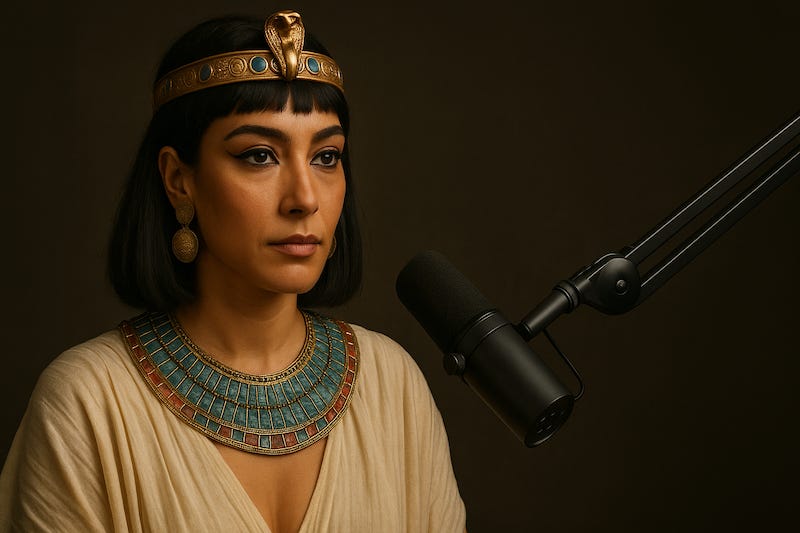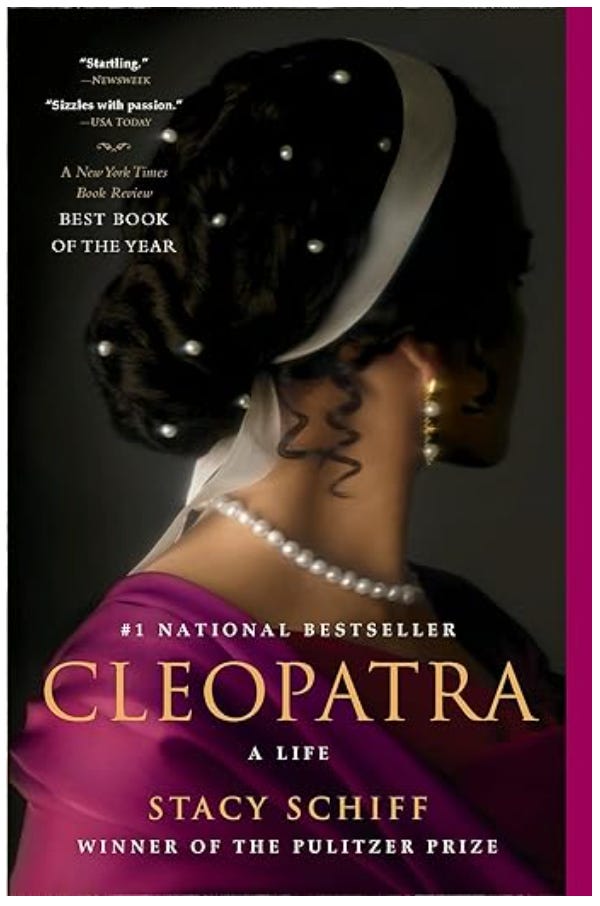Cleopatra – On Power, Perception, and the Price of Being a Woman in History
Recorded via ChronoTranscriptor™ 3.2 — March 15, 2025
[Host Introduction]
Today on ChronoTalks, we step even further back in time to speak with a woman whose name still evokes beauty, intelligence, and controversy: Cleopatra VII Philopator, last active ruler of the Ptolemaic Kingdom of Egypt.
More than two thousand years after her reign, she remains one of the most mythologized women in history—celebrated, vilified, exoticized, and misunderstood. Through the ChronoTranscriptor™, we’ve brought her into 2025 to ask how she saw power, how she used it, and how the world has remembered her—fairly or not.
[Interview Begins]
Host: Your Majesty, thank you for joining us today.
Cleopatra: The honor is mine. Though I confess, I’ve never addressed an audience that wears trousers and speaks with such strange accents.
Host: You were a queen at 18, and a ruler in a man’s world. What was the greatest challenge in holding power as a woman?
Cleopatra: Being heard. Not speaking—being heard. Men spoke louder, interrupted more often, and assumed themselves wiser by default. I learned early that power is not only in words, but in when—and how—you use them.
I used silence when needed. Seduction, when effective. And intellect, always. The Roman men who feared me wrote the stories that survive. They never quite forgave the idea that I could think faster than they could kill.
Host: You’ve been described as a seductress, a manipulator. How do you respond to that legacy?
Cleopatra: History flatters men and punishes women who are not easily controlled. Had I been a dull wife to a dull prince, I might have been called virtuous. Because I ruled, they called me dangerous.
Yes, I formed alliances with Caesar and Antony. But tell me—what Roman general didn’t use marriage and mistresses to advance their goals? My mistake, it seems, was in being as strategic as a man, but born as a woman.
Host: Do you feel your beauty has overshadowed your achievements?
Cleopatra: Completely. Men wrote of my appearance because they could not understand my influence. They measured power in armies; I measured it in language, trade, and loyalty. I spoke nine tongues and knew the price of every shipment down the Nile.
And yet, they reduce me to a pair of eyes and painted lips.
Let them. The legacy I leave is not in the color of my skin or the curve of my cheek—it is in how fiercely I held my country as it slipped through history’s fingers.
Host: If you ruled in today’s world, what kind of leader would you be?
Cleopatra: I would lead with calculation, yes—but also compassion. I understood the needs of my people. I was not born in a golden cradle. I came to power through blood, exile, and betrayal. So I knew the price of weakness—and the cost of cruelty.
In your world, I see many leaders speak boldly, but few listen. Fewer still think five moves ahead. I would surround myself with the brilliant and the blunt, and I would speak last—not first.
Host: What advice would you give to women in power today?
Cleopatra: Stop apologizing. Power is not a gift—it is a tool. If you have earned it, wield it. If you fear it, others will wield it against you.
You will be judged no matter what—too strong, too soft, too ambitious, too emotional. So be judged for doing something worth remembering.
Host: What do you hope people remember you for?
Cleopatra: Not the asp. Not the beauty. Not the men. But the mind behind it all.
Remember me as the last queen of an ancient world. A woman who bent history toward her will—if only for a time.
[Closing Remarks]
Host: Queen Cleopatra, thank you for your candor and your presence. It has been an honor to speak with you across the centuries.
Cleopatra: Then may your words travel as far as mine have—and be just as difficult to rewrite.
Next Episode: Leonardo da Vinci – On Curiosity, Machines, and the Limits of Genius.
Subscribe to ChronoTalks for more timeless interviews with history’s most fascinating figures.
Named one of the Best Books of the 21st Century by Kirkus Reviews, this biography by Pulitzer Prize-winning author Stacy Schiff breathes new life into one of history’s most captivating figures: Cleopatra, the last queen of Egypt.
Her palace glittered with onyx, garnets, and gold—but its true wealth lay in political cunning and seductive power. Far from the caricature of a temptress, Cleopatra was a brilliant strategist and a masterful negotiator.
Though her life spanned less than forty years, it dramatically reshaped the ancient world. She married two of her brothers—waging civil war against one as a teenager and poisoning the other. She also eliminated a rival sister; in her dynasty, incest and assassination were family traditions. Cleopatra is believed to have had intimate relations with only two men—but they were Julius Caesar and Mark Antony, the most powerful Romans of their time. Both were married to others. With Caesar, she bore a son; after his assassination, she had three more children with Antony. Already the wealthiest monarch in the Mediterranean, Cleopatra’s union with Antony solidified her position as the most influential woman of the age. Together, they sought to build a new empire—an ambition that would lead to their downfall and change the course of history.
Renowned long before she became infamous, Cleopatra has been remembered for all the wrong reasons. Shakespeare and Shaw gave her voice; Michelangelo, Tiepolo, and Elizabeth Taylor gave her a face. But the real woman—her intellect, charisma, and complexity—has been obscured by myth. In this stunning work, Schiff returns to classical sources with a discerning eye, stripping away centuries of legend to reveal the magnetic ruler whose death marked the end of an era. Richly detailed and sweeping in scope, Cleopatra is a luminous, deeply original portrait of a woman who continues to fascinate the world. More information…




